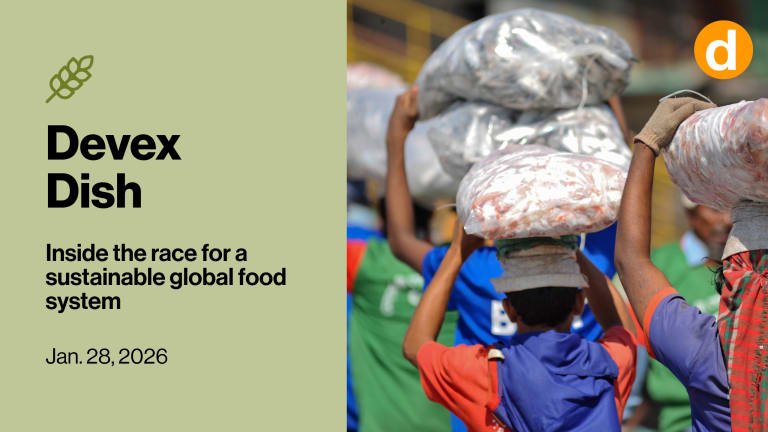
First published in UNEP’s Our Planet magazine.
Whenever I have the privilege of spending time among the people that the World Food Program serves, I come away enriched with precious extra knowledge and inspired by the new ways in which governments are tackling the world’s greatest solvable problem — hunger. That happened again recently when I was in Burkina Faso, heartened to see the results of efforts to help communities become more resilient to shocks, especially climate-related ones.
Yet one theme dominated my discussions with President Blaise Compaoré and government ministers — that too much of the food grown in their country is lost, often before it even leaves the farm. In Burkina, small-scale, family farming accounts for 70 percent of total agricultural production, so post-harvest losses badly dent the capacity of vulnerable farmers to make a decent living and that of the country to feed its people. The same is true for most developing countries, where food loss occurs mostly at the production stages — harvesting, processing and distribution.
Our sister agency FAO estimates that close to one-third of all food produced worldwide is lost or wasted in food production and consumption systems. At the same time, around 870 million people suffer hunger, often not knowing where their next meal is coming from.
We expect to have to feed 9 billion people on this planet by 2050 and are going to have to do it with less land and less water, due to slow onset climatic changes, while coping with more frequent extreme weather events. So there is no space for loss or waste.
Encouragingly, though, tackling post-harvest loss is not rocket science. It does not require technological breakthroughs or years of high level scientific research as do some of the other challenges we face.
We at WFP have seen farmers’ capacity to prevent food loss transformed thanks to the Purchase for Progress (P4P) pilot project, which we launched with partners five years ago to test new ways to buy food that could enable smallholder farmers to achieve better yields, improve the quality of their crops and sell to reliable buyers for a fair price. Addressing post-harvest loss has been a pillar of the programme in the 20 countries it covers.
Developing country farmers, especially smallholders, face many problems after the harvest. Proper storage is rare or in need of repair, meaning fresh crops are often exposed to the elements and such vermin as weevils or rats. When farmers dry grain in the sun, something as simple as a sudden shower can spoil it. This leads to rotten grains or the development of aflatoxin, which can cause liver cancer.
But the outcome can be radically different when farmers receive proper training, such as awareness-raising on the existence and effects of aflatoxin and advice on storage, including providing simple tarpaulins to dry the grains, and household or communal silos to store them.
So far, more than 193,000 farmers, agricultural technicians, warehouse operators and small and medium-sized traders have received training from WFP and partners in improved agricultural production, post-harvest handling and quality assurance through P4P. I am particularly proud that, on average, one third of the trainees were women — and we’re constantly striving to reach parity.
The results are outstanding. Training has greatly helped farmers to increase the quality of produce. At the start of P4P, most farmers’ organisations paid little attention to quality. Now even those with low capacity have been able to meet WFP’s rigorous quality standards relatively quickly. As a result, rejection of consignments because they failed to meet quality standard is increasingly rare.
The training process has also inspired innovation. In Guatemala, the P4P team created the Blue Box — a portable lab about the size of a large trolley bag — containing a nickel pike grain tester, digital scales, sieves, a voltage converter, a humidity sensor, a mill, a digital clock and the aflatoxin test kit.
P4P staff and partners clock up thousands of kilometers on highways and mountain tracks to reach remote farming communities. Training with the Blue Box means they can test in the field and identify any problems early on. Farmers become much more aware of quality and post-harvest management and their confidence grows. They now know the quality of their staple grains and the just price for it, whether they’re selling to WFP or to other buyers.
Tackling post-harvest loss also strengthens agriculture and local economies. We work closely with FAO and the International Fund for Agricultural Development to ensure a continuum from the emergency work where WFP is often the first responder, through recovery to development.
But preventing food that could nourish the hungry from being lost early in the food chain requires the coordinated efforts of many actors.
National governments should take the lead in their own countries and embrace solutions at a policy framework level. Addressing waste across the food chain must be a critical pillar of future national food strategies. International agencies and NGOs also need to coordinate their efforts fully to support farmers in growing more, growing better and accessing markets. And community leaders must help their people understand and work together to prevent their maize, rice, beans or other staple crops from being damaged or destroyed.
The experience of P4P is showing us clearly that, with the right support and knowledge, it is possible to prevent losses of precious food in poor countries struggling to achieve food security. In the years ahead we will need to share those lessons far and wide to meet the challenge of feeding our growing population.
Join the Devex community and access more in-depth analysis, breaking news and business advice — and a host of other services — on international development, humanitarian aid and global health.
Search for articles
Most Read
- 1
- 2
- 3
- 4
- 5








